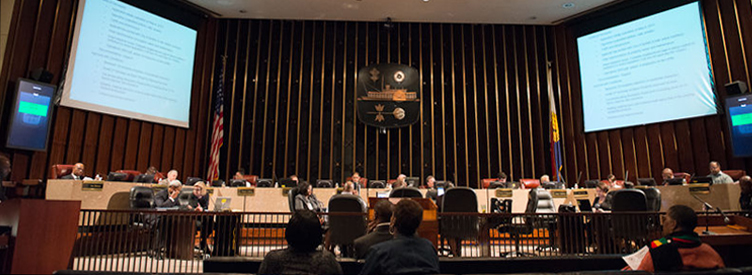 A Rhode Island judge sided with the state on Tuesday when she ruled that a jury will hear the lawsuit over the state’s 2011 pension reforms.
A Rhode Island judge sided with the state on Tuesday when she ruled that a jury will hear the lawsuit over the state’s 2011 pension reforms.
More details from WPRI:
Taft-Carter said that while she disagreed with state lawyers’ arguments that they had a constitutional right to a jury trial in the pension case, she would use her discretion to grant a jury trial in light of what she said is the Rhode Island Supreme Court’s long-stated preference for using juries.
“Being mindful of the importance of a jury trial in this country, and our Supreme Court’s expressed preference in favor of having questions of facts to be tried before a jury even where equitable claims are involved, the court is satisfied that these cases should be properly tried before a jury,” Taft-Carter said from the bench.
[…]
R.I. Superior Court Judge Sarah Taft-Carter read her lengthy decision about the jury trial from the bench Tuesday morning at Newport County Superior Court, where she is currently assigned to hear cases. She announced the trial date after conferring with lawyers from both sides in a closed-door status conference.
At stake is whether Rhode Island legislators acted constitutionally three years ago when they reduced future retirement benefits to shave roughly $4 billion off the shortfall in the state’s pension fund for government workers and taxpayers.
Reactions from lawyers on both sides of the case:
John Tarantino, a lawyer for the state, said he was pleased by Taft-Carter’s decision but that it was too early to say when jury selection would take place or how many jurors there would be. “We think a jury should decide it,” he told reporters. “I’m a big believer in jury trials.”
Lawyers for the union plaintiffs declined to comment on the state’s legal victory Tuesday.
[…]
Tarantino and the other lawyers representing Gov. Lincoln Chafee and General Treasurer Gina Raimondo argued in court filings that the state, as a defendant, has a constitutional right to a jury trial and should be allowed to have jurors decide the case, rather than just Taft-Carter ruling on her own. The lawyers representing the unions and retirees opposed the idea, saying it didn’t fit the legal issues at hand.
The state’s 2011 pension reforms were especially controversial because they applied to all workers and retirees, not just new hires.









